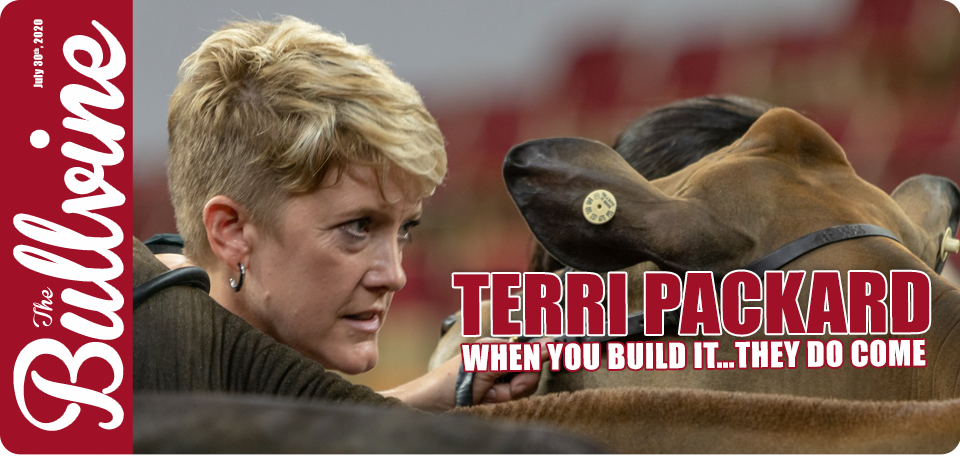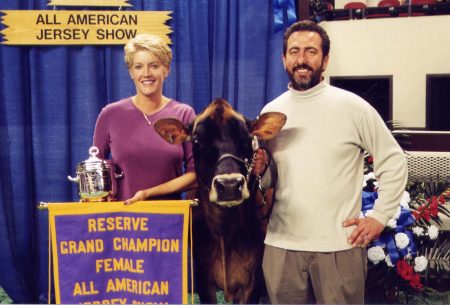 Kueffner Cows’ Terri Packard is a rare mix of elegance and grit.
Kueffner Cows’ Terri Packard is a rare mix of elegance and grit.
Although she isn’t royal in the strictest sense, there’s no doubt her iron-clad reputation makes her one of the industry’s blue bloods – and a shining example when it comes to talent, integrity, intelligence and grace under pressure.
Terri is married to Ernie Kueffner, and there is nothing this power couple has not achieved in the industry – for others – and, for themselves. They are among the small echelon of A-listers that influence the top end of the global registered-cattle business. (Read more: KUEFFNER DAIRY TEAMWORK “2 Dream the Impossible Dream!”)
Terri was recently named a judge for the National Jersey Jug Futurity at Louisville. It’s only the second time a woman has been asked to judge the world’s oldest and richest class for dairy cattle. The first was Alta Mae Core, and it’s an accolade Ernie believes is long overdue.
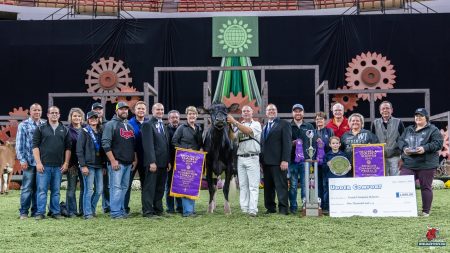 Terri is not only ready to step up to judge, she is also ready to speak up about the registered industry, her defining moments, what it takes to market cattle, and the extreme solution the couple has been mulling over to combat the cancellation of this year’s World Dairy Expo (WDE)…
Terri is not only ready to step up to judge, she is also ready to speak up about the registered industry, her defining moments, what it takes to market cattle, and the extreme solution the couple has been mulling over to combat the cancellation of this year’s World Dairy Expo (WDE)…
Now settled full-time at Kueffner Cows in Western Maryland, Terri and Ernie are well-known for launching Arethusa Farm’s brand, and taking its cows – among other achievements – to a history-breaking effort at the WDE. It was 2004 when Arethusa won both Supreme and Reserve Supreme Champion with their Holstein, Hillcroft Leader Melanie, and Jersey Huronia Centurion Veronica. (Read more: Arethusa: A Winning Focus)
The couple also co-managed (with Dan Donor and Isaac Lancaster) and hosted the Global Glamour sale from Arethusa’s Connecticut base in 2008, which averaged US$97,491, when Apple was sold for US$1 million. They won Premier Breeder banners for Arethusa in the two toughest breeds at WDE – Holsteins and Jerseys.
 More recently, Terri and Ernie were the co-owners, masterminds and grunt behind the 2019 WDE Grand Champion Holstein, Butz-Butler Gold Barbara EX95, who was 65 days fresh after a break of two years.
More recently, Terri and Ernie were the co-owners, masterminds and grunt behind the 2019 WDE Grand Champion Holstein, Butz-Butler Gold Barbara EX95, who was 65 days fresh after a break of two years.
There have been too many blue ribbons and Grand Champions in between to mention.
Great cows need care
Known equally for her cowmanship as for her marketing genius, Terri’s talent – in combination with Ernie’s – has granted the couple access to some of the best cows and deepest pockets in the industry.
Yet being a sixth-generation farmer, Terri’s ultimate master remains as it has always been: hard graft.
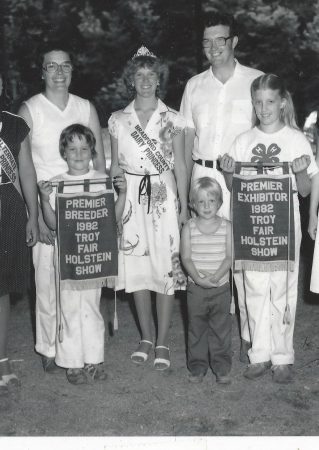 Terri has overhead people saying it’s easy to market great cows on the budgets they’ve had access to over the years. Her reply is simple.
Terri has overhead people saying it’s easy to market great cows on the budgets they’ve had access to over the years. Her reply is simple.
“Yes, we have worked with a lot of people who have had money, and some people say we bought the cows, and there was the money to do it.
“But, one of the biggest things for me in marketing is first and foremost you have to take care of the cows. Without them, you have nothing. It doesn’t cost anything to brush tails, and soap is cheap.
“Yes, you can spend a lot of money on a beautiful display at a show, but if all you do is look after the cows, you’re still promoting your ability, your programme, and your attention to detail.
“There’s honestly nothing I enjoy doing more at a show than brushing tails. It’s therapy. We were all taught in 4H to clean hooves, ears, and have the sweat out from the udders … and so many seem to forget that. It’s something you can do without a lot of financial outlay. That’s what my mother taught me. And, wow, she was tough. She taught me more about elbow grease than anything else.”
Within the bigger picture, it has been Terri’s upbringing in northern Pennsylvania, her 4H experience, her personal journey, and Terri and Ernie’s partnership – all of which has collectively contributed to her stellar career.
More than show day
Terri says not having WDE this year will sort out who truly is prepared to put the work in on their cattle day in, day out.
“With the shows falling like dominos, it’s going to sort the people out. I’m talking about the people who take care of their cows every day, no matter what, and who takes care of them ‘just because there is a show on’ – because this is an every-day, detail-oriented business.”
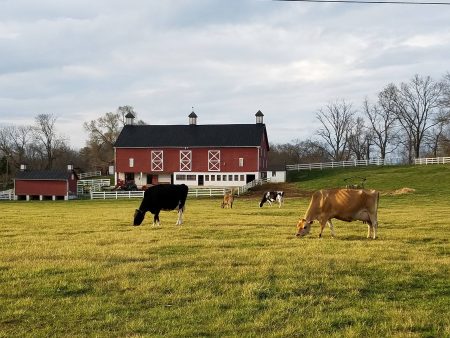 Terri says Ernie still gets up every night between midnight and 2 am to check the cows whether there is a show on the horizon or not.
Terri says Ernie still gets up every night between midnight and 2 am to check the cows whether there is a show on the horizon or not.
He either puts the lights on them if they are in the pasture, or he picks the shits while he’s there if they are in the stalls. Terri does the early morning shift. They know their best insurance is having eyes on their cows.
Terri says, “You can’t teach people to observe. You either have it, or you don’t. You can teach them all the other stuff. But not that.
“Ernie gets annoyed with me at shows, because I’m on the wash rack, which is my one-on-one time with the cows, and I’ll come in and say, ‘There’s a cut on this cow, this cow has some swelling in her neck, and I can smell some hoof rot’. He’ll say to me, ‘Did anything good happen on the wash rack?’.
“But, we both know that observing and the attention to detail is so important, and it’s unrelenting.”
Unsurprisingly, it was Terri who suggested a sign for the new barn’s entrance at Arethusa. It’s a statement that hung at Ernie’s family operation in Wisconsin: “Every cow in this barn is a lady. Please treat her as such.”
It speaks to both of their hearts.
Ernie on Terri’s talent
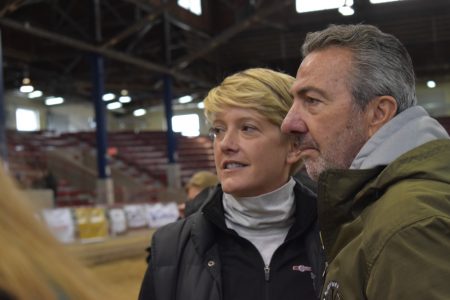 As always with industry couples who are both talented, Ernie has often been given the lead. However, his respect for his wife runs deep, and he says her judging role at Louisville’s National Jersey Jug Futurity is overdue.
As always with industry couples who are both talented, Ernie has often been given the lead. However, his respect for his wife runs deep, and he says her judging role at Louisville’s National Jersey Jug Futurity is overdue.
Ernie says, “In agriculture, to get to the top requires sacrifices. If they’re willing to do it, I’ve always thought that women had as much – or more – ability than the men. I’ve never had a question about that in my mind.
“I thought there was an opportunity for Terri to go forward to judge because she’s ready, she enjoys it, and that’s extremely important. She’s been up for judging roles before now, and she’s been beaten by males that aren’t qualified as her … because they’re men. It’s irritating. In fact, it irritates me a lot, because I believe that holds a number of women back sometimes.
“When she got the Louisville appointment – even though we don’t know for sure [the event] is going to happen – it was quite thrilling.”
Ernie also says Terri has strong opinions – these will keep her steady when she gets to the pointy end of the day.
“Over the years I’ve seen when certain male or female judges get to the Grand Champion – the very important times – they start to second guess themselves. Terri doesn’t second guess herself.”
Terri confirms she enjoys judging, and she knows it includes some pressure for her peers.
“I think it’s hard being in a situation whereas a couple the two of us have had success. People think I might do what Ernie would like. It’s hard to get out of that shadow, and it seems to be hard for people to understand that you might have your own opinion.
“If a woman doesn’t do a good job judging, then it’s that much harder to get momentum for other women. If a man does a bad job, it doesn’t hurt the other guys as much.”
Terri’s associate in the National Jersey Jug Futurity will be the dry-witted Richard Caverly, who managed Arethusa before Ernie and Terri took over.
Ernie’s best deal
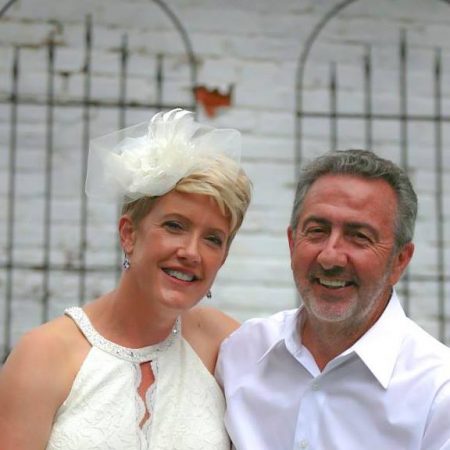 Ernie says his wife is one of the special ones, and when asked what she has brought to their operation, he doesn’t hesitate to give her the credit she deserves.
Ernie says his wife is one of the special ones, and when asked what she has brought to their operation, he doesn’t hesitate to give her the credit she deserves.
“It’s a little difficult to answer real quick because she obviously brings a great deal. She brings a lot of energy and a lot of objectivity.
“She does physical, mental and emotional work, and she’s outstanding in marketing and advertising. Terri can do anything – and she does it well.”
He smiles, “We don’t always agree, and sometimes she takes longer to do some jobs than I’d like her to, but she always does it well.”
He quips, “And when she gets a new haircut, that looks good too!”
All jokes aside, Ernie knows he made the best deal of his life when Terri agreed to share her life with him.
“There is an integrity and decency in Terri which means she can also go to any farm anywhere, at any time and she will always be welcomed.
“That’s quite a compliment. I’m not sure I’d be welcome everywhere, but that’s okay. Because there’s some places I don’t want to go.”
Arethusa was defining
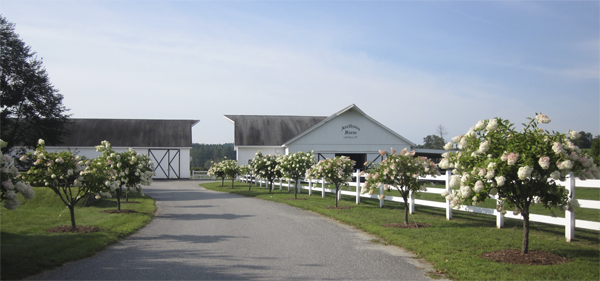 What some don’t know about the couple’s dominating run at Arethusa is that for the first 12 months of their full-time association, Terri managed Arethusa while Ernie continued to run their home operation – six hours away.
What some don’t know about the couple’s dominating run at Arethusa is that for the first 12 months of their full-time association, Terri managed Arethusa while Ernie continued to run their home operation – six hours away.
She was 33 at the time, and Ernie and Terri had never milked more than 15 to 20 cows at home. Her brother, David, worked alongside her, and Ernie commuted a couple of times a month. It was a defining appointment for Terri.
Ernie says, “That was probably quite extreme for Terri at the time, and she was probably quite shocked for the first five minutes after I suggested it. But, for me, it was simple. From a personal standpoint, I wanted her to be more challenged; I knew she’d do well, and I knew there would be no failure.”
Terri agreed that she was stunned when Ernie suggested it without discussing it with her first.
“That really changed me – because it threw me out there,” Terri says. “I wasn’t on my own entirely, but it sure felt like it. That first year we were there, our mother [Marilyn], passed away and David and I were on this new farm, with young employees, Japanese interns and college kids.
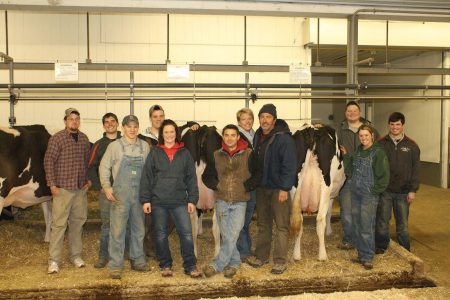 “It was like being a parent in many ways, but I also had the responsibility of the cows. It was a lot. But I enjoyed it. There were days in the beginning where I was out mowing the lawn, trimming bushes, and mowing the pastures, because in the beginning, we did it all. When it got to that first successful year at Madison, that put me in the office full time, and I then became the relief milker.”
“It was like being a parent in many ways, but I also had the responsibility of the cows. It was a lot. But I enjoyed it. There were days in the beginning where I was out mowing the lawn, trimming bushes, and mowing the pastures, because in the beginning, we did it all. When it got to that first successful year at Madison, that put me in the office full time, and I then became the relief milker.”
The 2004 WDE success put a lot of pressure on Terri and Ernie because it “ratcheted” up Arethusa’s owner’s expectations. And the industry was paying attention.
Terri says, “When you have a certain amount of success, there are people that are happy for you, and there are people that are jealous. Some people are both.
“But Arethusa was great at letting us do our job. From the beginning we said we would stay involved as long as they remembered that the cows came first, followed by the owners, and then the employees. But, the cows would always come first.”
When the couple called time on Arethusa after a decade, they gave owners George Malkemus and Tony Yurgaitis just over a year’s warning to put their plans in place.
“Sometimes it feels like it was a lifetime ago. We had a great group of cows and a great group of young people.
“One of the best things was the people we got to work with. Because we had young people who wanted to learn. And, they were dedicated, teachable and they loved cows.
“They’ve gone on to do great things. At one point, we had former employees managing every one of the major show herds in North America.
“We still get calls and texts with what they’re doing. That’s been a major highlight for both of us to watch their careers.”
Reputations make sales
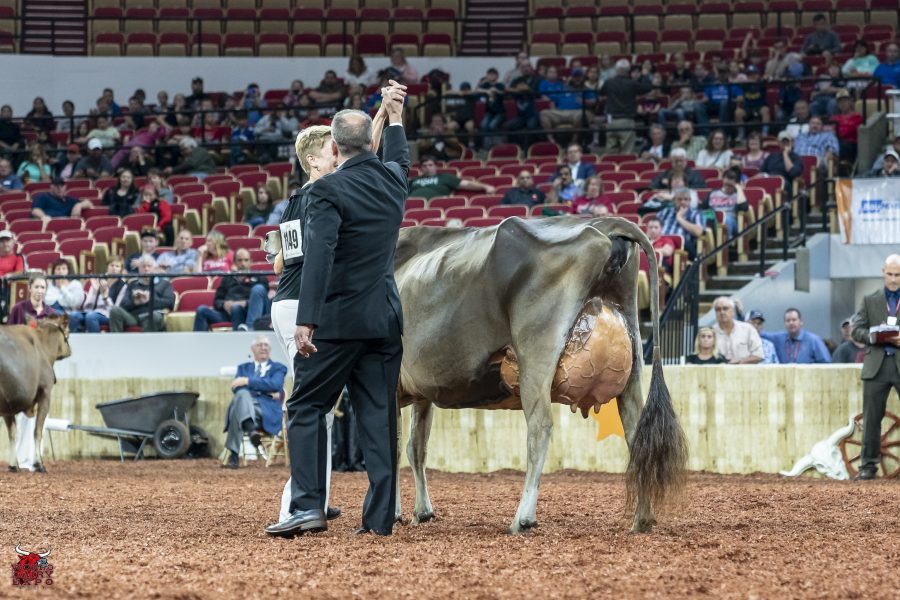 Terri and Ernie were planning a sale in conjunction with the Franchise Kind in June.
Terri and Ernie were planning a sale in conjunction with the Franchise Kind in June.
When COVID-19 happened, they were preparing to hunker down and ride it out until they could re-schedule.
In the interim, the Hogan family, who milks over 5000 cows at Misty Meadow Dairy in Oregon, approached them with an eye on acquiring the 2018 WDE Intermediate Champion and Reserve Grand Champion, South Mountain Voltage Radiant EX91. Ernie had always said she was for sale. On one condition.
“There was one cow in particular that they wanted and other people have asked about her at different times,” Terri confirms. “And, the answer was, ‘Yes, Radiant is for sale, but not alone’. Because, if she is not here, the excitement is gone about going to the barn in the morning for Ernie.
“He’s said that for a couple of years now.”
“Finally, I just gave the Hogan family the spreadsheet of all our animals, and they came back and asked us how much for all of them. You can’t pass up that kind of opportunity. Ernie and I each picked out one baby calf to keep and we have a couple of donors, some Holstein heifers, a Brown Swiss donor and Barbara left.
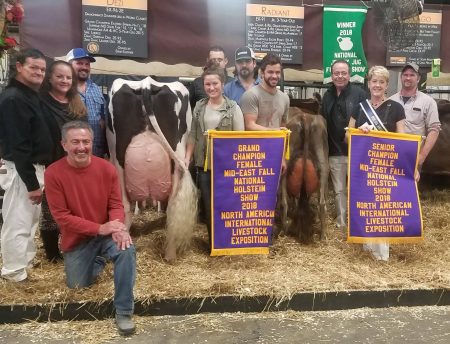 “We still have Radiant here too on behalf of the Hogans, because we had planned to prepare her for Madison. Hopefully, Louisville will go ahead, so we can get her out there.”
“We still have Radiant here too on behalf of the Hogans, because we had planned to prepare her for Madison. Hopefully, Louisville will go ahead, so we can get her out there.”
Importantly, Terri and Ernie have never been able to ship milk in their operation, and so 37 head were loaded up for their new future. They are now in the care of Misty Meadow’s herdsman, Danny Upchurch. Danny handled a lot of the sale detail and is responsible for the family’s type herd, which is currently located in California while a facility is being acquired for them in Oregon.
“We sold because there was so much uncertainty in these unprecedented times. We didn’t know when we’d be able to have a sale, what the economy would be, whether anybody would be in the mood to buy anything and whether there would be any shows. And, when somebody comes along with sincere interest in type cattle with pedigrees who wanted to breed from them, we had to consider it.”
Ernie and Terri remain in the mix, helping the new owners with decisions related to marketing, showing and breeding.
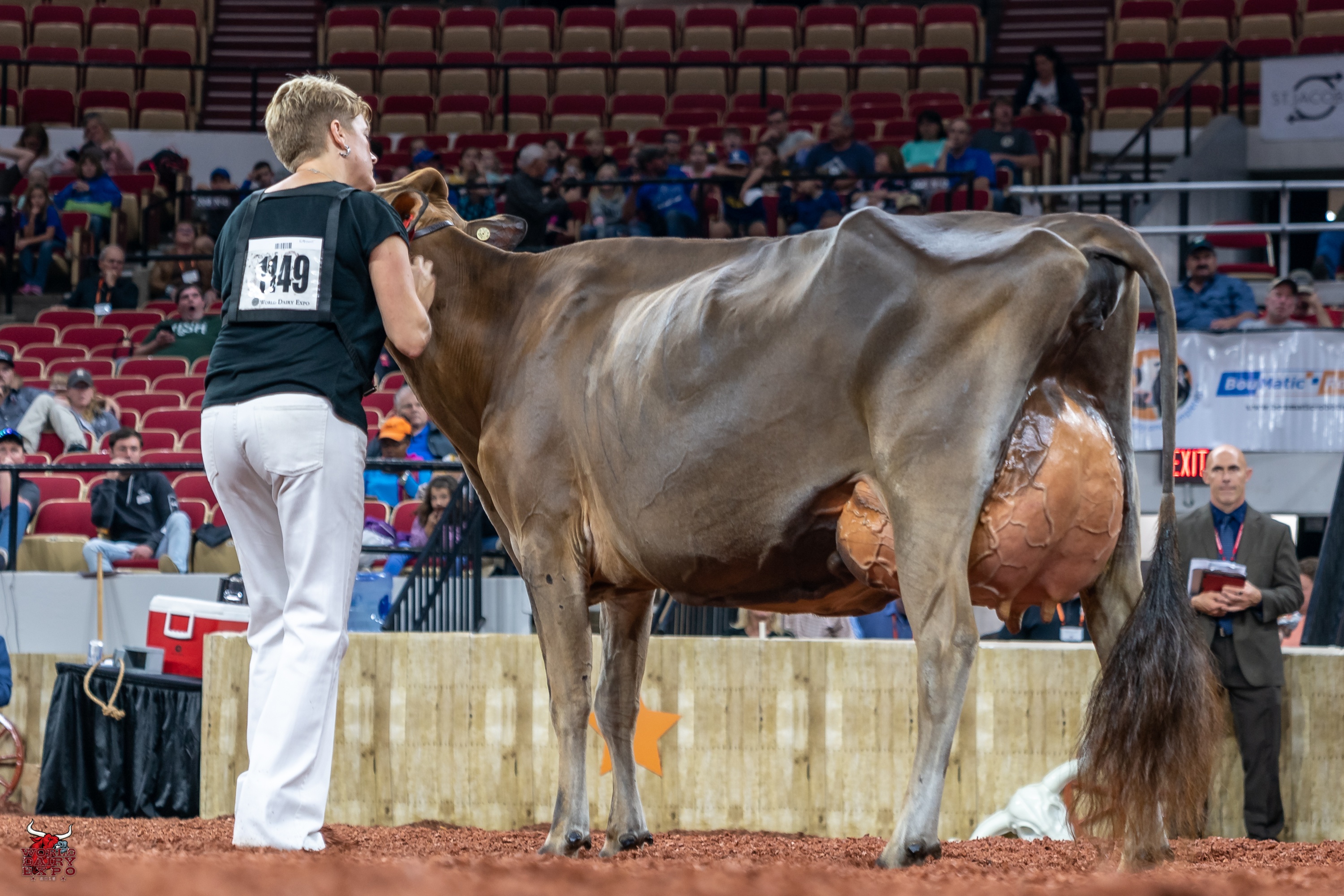 “It’s hard to see them go, and I still cried when we left after visiting them, but they look good,” Terri said. “They’re doing well and they’re happy. The first day we walked in there they were so buried in this beautiful oat hay they were eating that they didn’t even want to talk to us. Which was good. They’ve adjusted well, and it couldn’t be more opposite living for them.
“It’s hard to see them go, and I still cried when we left after visiting them, but they look good,” Terri said. “They’re doing well and they’re happy. The first day we walked in there they were so buried in this beautiful oat hay they were eating that they didn’t even want to talk to us. Which was good. They’ve adjusted well, and it couldn’t be more opposite living for them.
“But this is the first time since we’ve lived here for 23 years that there’s not been a Jersey heifer on this farm.”
Circular business
Terri says she wasn’t surprised when Ernie immediately started gathering new animals.
“This is an addiction, right?! No sooner had we got them loaded and out the driveway than Ernie started talking about Michael Heath and Nathan Thomas’s sale, which was running a week later. Ernie felt he should support it because he’s a firm believer that everyone in this industry has to give and take.”
They bought a springing heifer that caught Terri’s eye, who they say has calved out beautifully. Terri says while buying goes against their “sort of” plans to slow up, they both have a happy knack for finding the good ones.
“I give Ernie a hard time about it, but it’s usually beneficial,” she pauses reflectively. “If we sell a whole bunch of cattle, two years later he’ll end up buying one of them back. When we had our sale in 2016, we sold a bred heifer for $5500. She calved out the next year, and Mike Deaver called and said, ‘You might want to know about this one.’
“We bought her back over the phone, and we never saw her before she arrived at the farm. That was Radiant. And, he’s done it before.”
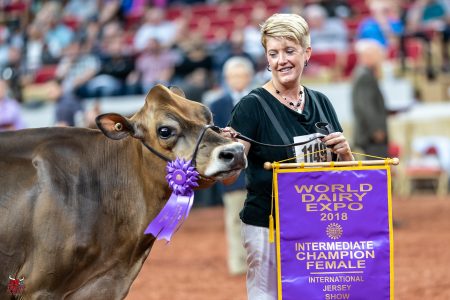 Another Jersey recently joined them – a daughter from Radiant – who was sold last year. She’s owned in partnership with RCD Jerseys (Rankin, Ceresna and Deist).
Another Jersey recently joined them – a daughter from Radiant – who was sold last year. She’s owned in partnership with RCD Jerseys (Rankin, Ceresna and Deist).
The two calves they chose to keep include Ernie’s choice of a Velocity out of Radiant, while Terri chose a calf who goes back to one of the first Jerseys they bought from Canada after they moved to Boonsboro in 1997.
Terri says, “I’m keeping something out of that Sofie family until we’re done. Her dam is a Premier x Comerica x Deluxe x Premonition x Sofie and she’s sired by Velocity too, so I’ve got my shot of Veronica in there.”
Giving up the business may have been muted, but somehow it still feels a world away.
“We did have that discussion pretty seriously, and I thought selling that many cattle during a pandemic might be a sign that perhaps it is enough, and we should slow down.
“Ernie is almost 20 years older than me, he’s got Parkinson’s Disease, and while he’s working hard against it, he does have it.”
Barbara: sweet win
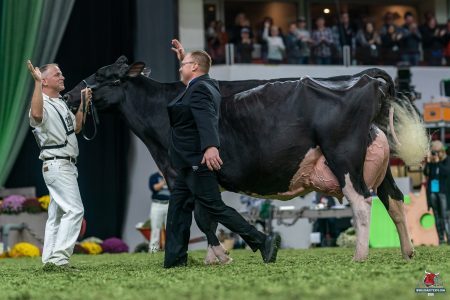 When the talk turns to achievement and favourite cows, Terri says for Barbara to go all the way last year under judge Chad Ryan, of Fond du Lac in Wisconsin, was a personal sweet spot in her career.
When the talk turns to achievement and favourite cows, Terri says for Barbara to go all the way last year under judge Chad Ryan, of Fond du Lac in Wisconsin, was a personal sweet spot in her career.
“I remember when Barbara was in the ring, all these people were wanting to talk to me. And, all I wanted to do was to watch that cow,” Terri said. “Finally I got up on top of a chair, so that no-one could talk to me.
“Because that moment was the culmination of so, so much work, and I just wanted to see Barbara be happy, and see her appreciated.
“We’ve shown some beautiful older cows in the last few years that have been hammered in the ring. And, I wanted to see a judge respect an older cow. And, I’ve never seen her in all the years we’ve had her behave so well and look so happy out there, and just show off like Veronica and Ashlyn used to do.
“That moment made up for all the hours of work over the years.”
Terri says Barbara calved at the end of July. She hadn’t had a calf in two years, was fat and angry to be in-milk again.
“She was wicked. She was the nastiest Holstein cow I’d ever milked for those first two weeks. She was so mad that her udder was full of milk. We had quite a roller coaster ride with her for 65 days, and then to stand there looking at her in the ring was a testament to the cow and to the judge, who was so respectful of both the cows and the exhibitors.
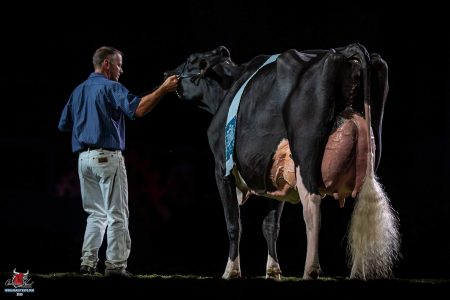 “I don’t think anyone would feel that he didn’t give their cows time that day.
“I don’t think anyone would feel that he didn’t give their cows time that day.
“If we never showed again after that, I’m okay with that.”
Barbara inspirational
Terri Packard worries that missing WDE could be critical for a number of form cows, and she has been mulling over an edgy alternative because it also worries her what the industry will do without some light at the end of the tunnel.
“Every day since they’ve cancelled WDE, I have the discussion with my husband about another show.”
“So many of these cows have that one day like Barbara, and you may not ever get it back. That’s one of the main reasons why I want a show this year. For all these cows that are ready.
“People say there is always next year, but there may not be next year for some of them.”
Veronica still favourite
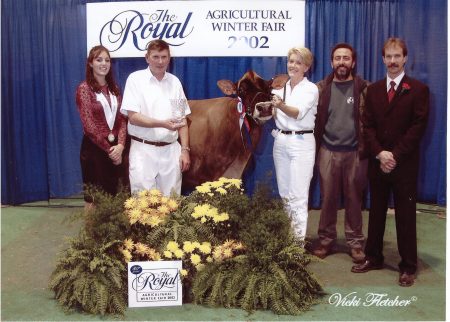 People who know cows, know that if they get great care and management, they have the confidence to show their personality and intellect.
People who know cows, know that if they get great care and management, they have the confidence to show their personality and intellect.
And, of all the great ones Terri has worked with – even though she was reared with Holsteins – it is a household Jersey name, Veronica, who remains her favourite.
“There’s been so many unique and interesting animals I’ve worked with, but I don’t think anyone else looked at you like they knew what you were talking about like Veronica did.
“She was so aware of people. It is 18 years since we bought her, and we worked with her for more than 10 years, and we still tell the stories about her because she was just that smart.
“She had such an appetite, and she was so aggressive at a show. When we would take her out to be washed, Ernie would have to stand the end of the barn and clear the way for her when she came back.
“Because as soon as she got to the door, she knew her feed would be in her stall, and no-one could hold her back. We literally always had the biggest guy we had in our team bring her in, and she’d start getting mad, and Ernie would say, ‘Let her go.’ She’d just storm into the barn, and into her stall, and start eating.
“She was the same in the clipping chute. And, she knew when people were watching her. You could see the angle of her head change. One day we were classifying Holsteins at Arethusa, and we were washing and clipping the cows and the Holsteins were getting all the attention, and that morning we left the Jerseys out.
“When they let the cows back in to feed, we turned around and Veronica had walked into the barn, and she was standing in the clipping chute like she was saying, ‘What am I? Chopped liver?’
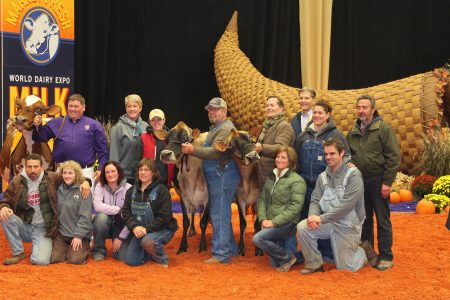 “Norman [Nabholz] used to lead her, but I remember one year we took her to Louisville, and she was pissed that day. Norman saw her come out of the chute really mad, she was hauling arse as she stormed up the aisle and into her stall, and he was like, ‘I can’t do it. I’m out. She’s gonna take me for a ride’.
“Norman [Nabholz] used to lead her, but I remember one year we took her to Louisville, and she was pissed that day. Norman saw her come out of the chute really mad, she was hauling arse as she stormed up the aisle and into her stall, and he was like, ‘I can’t do it. I’m out. She’s gonna take me for a ride’.
“Ernie was like, ‘We haven’t got time for this’. Norman said, ‘Steve White will do it’. And, Ernie didn’t think he would. And, Norm replied, ‘He will if I ask him’.
“Steve is such a big, broad-shouldered man, and luckily for us he said he’d do it. So, we walked Veronica down to the ring with Norman at the halter and right before Veronica went into the ring, Steve took over.
“And, you could see Veronica slowly look up at Steve, take in his size advantage, and you could literally see her thinking, ‘I’m not gonna be messing with this guy’. She led like a dream that day, and she was Champion.”
Does Terri think she would have led for Norman?
“I think that day she might have taken him.
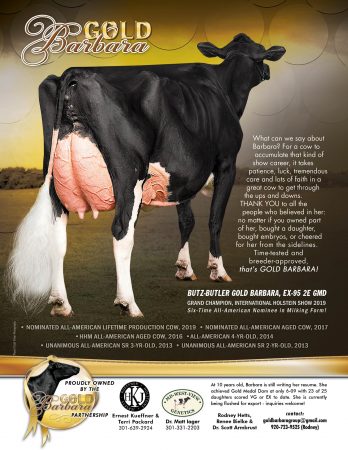 “Everything she did was always extreme. It was great to be around her. I led her twice over the years – once at The Royal as a second-calved two-year-old when she was Intermediate Champion and Reserve Grand under Steve Borland – and, as a 10-year-old at the Spring Show where she was Reserve Grand. But she was a handful and headstrong. Her great-granddaughter acts just like her.
“Everything she did was always extreme. It was great to be around her. I led her twice over the years – once at The Royal as a second-calved two-year-old when she was Intermediate Champion and Reserve Grand under Steve Borland – and, as a 10-year-old at the Spring Show where she was Reserve Grand. But she was a handful and headstrong. Her great-granddaughter acts just like her.
“Jerseys have so much more personality than Holsteins, and they just draw you in. There’s the rare Holstein that is responsive like that, and Barbara is one of them, so I enjoy working with her, and I love observing her.”
Terri says Jerseys might get sick a little quicker than Holsteins, but they get better faster.
“And, don’t let anyone tell you they don’t eat as much.”
Delicate marketing dance
Terri warns that marketing in today’s world is a delicate dance.
“I think it’s just so important, especially now that we don’t get a Holstein World, and every state doesn’t have their own breed publications. We’ve got to build our own hype, and have our cows in front of people. And, it’s very accessible to do that through social media.
“But, I don’t like to badger everyone, because – when I need to market – I want them to listen.”
Every industry needs leaders
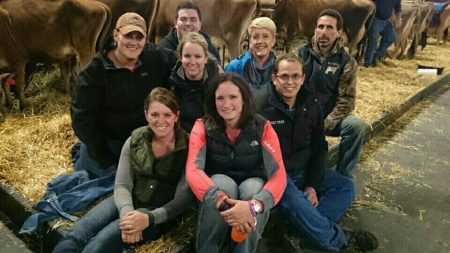 In closing, Terri hopes there is room in the industry for the next generation to come through.
In closing, Terri hopes there is room in the industry for the next generation to come through.
“There are a lot of young people out there who have a strong interest in registered cattle, and they want to take care of good cows,” Terri said. “But I don’t see very many of them going out and buying the farms, or having the income to be the next generation of that.
“All these young people who love to do this – there needs to be the next layers of owners who can afford to hire them, and who can afford to take care of these good cows.
“I hope there are enough people that still get excited about going to the shows and having a nice cow to look at in the barn in the morning.
“Because it does take more work, those kinds of cows do need more care, and in order to be developed to that point…it’s every day – it’s not just once you get on the truck, and head out for the show.”
It’s been said that without someone to set the bar, how does everyone else know how high they have to climb?
There’s no doubt that Terri and Ernie help bring the energy, and the excitement, that makes this industry special and compelling for everyone else. And Terri is a beacon for young women who are aspiring to take lead roles at any level.

